- Home
- W. Somerset Maugham
Collected Short Stories Volume 4 Page 5
Collected Short Stories Volume 4 Read online
Page 5
'I was afraid so,' he said, frowning a little. He gave a short sigh. 'I couldn't do anything else.'
I didn't understand what he meant. At that moment Mrs Hardy joined us and slipped her arm through her husband's. He took her hand in his and gently pressed it. He gave her a look that had in it something pleased and humorously affectionate, as though he didn't take her quite seriously, but enjoyed his sense of proprietorship and was proud of her beauty. She really was lovely. She was not at all shy, she asked me to call her Sally before we'd known one another ten minutes, and she was quick in the uptake. Of course, just then she was excited at arriving. She'd never been East and everything thrilled her. It was quite obvious that she was head over heels in love with Tim. Her eyes never left him and she hung on his words. We had a jolly breakfast and then we parted. They got into their car to go home and I into mine to go to Lahad. I promised to go straight to the estate from there and in point of fact it was out of my way to pass by my house. I took a change with me. I didn't see why Olive shouldn't like Sally very much, she was frank and gay, and ingenuous; she was extremely young, she couldn't have been more than nineteen, and her wonderful prettiness couldn't fail to appeal to Olive. I was just as glad to have had a reasonable excuse to leave the three of them by themselves for the day, but as I started out from Lahad I had a notion that by the time I arrived they would all be pleased to see me. I drove up to the bungalow and blew my horn two or three times, expecting someone to appear. Not a soul. The place was in total darkness. I was surprised. It was absolutely silent. I couldn't make it out. They must be in. Very odd, I thought. I waited a moment, then got out of the car and walked up the steps. At the top of them I stumbled over something. I swore and bent down to see what it was; it had felt like a body. There was a cry and I saw it was the amah. She shrank back cowering as I touched her and broke into loud wails.
'What the hell's the matter?' I cried, and then I felt a hand on my arm and heard a voice: Tuan, Tuan. I turned and in the darkness recognized Tim's head boy. He began to speak in little frightened gasps. I listened to him with horror. What he told me was unspeakable. I pushed him aside and rushed into the house. The sitting-room was dark. I turned on the light. The first thing I saw was Sally huddled up in an arm-chair. She was startled by my sudden appearance and cried out. I could hardly speak. I asked her if it was true. When she told me it was I felt the room suddenly going round and round me. I had to sit down. As the car that bore Tim and Sally drove up the road that led to the house and Tim sounded the claxon to announce their arrival and the boys and the amah ran out to greet them there was the sound of a shot. They ran to Olive's room and found her lying in front of the looking-glass in a pool of blood. She had shot herself with Tim's revolver.
'Is she dead?' I said.
'No, they sent for the doctor, and he took her to the hospital.'
I hardly knew what I was doing. I didn't even trouble to tell Sally where I was going. I got up and staggered to the door. I got into the car and told my seis to drive like hell to the hospital. I rushed in. I asked where she was. They tried to bar my way, but I pushed them aside. I knew where the private rooms were. Someone clung to my arm, but I shook him off. I vaguely understood that the doctor had given instructions that no one was to go into the room. I didn't care about that. There was an orderly at the door; he put out his arm to prevent me from passing. I swore at him and told him to get out of my way. I suppose I made a row, I was beside myself; the door was opened and the doctor came out.
'Who's making all this noise?' he said. 'Oh, it's you. What do you want?'
'Is she dead?' I asked.
'No. But she's unconscious. She never regained consciousness. It's only a matter of an hour or two.'
'I want to see her.'
'You can't.'
'I'm engaged to her.'
'You?' he cried, and even at that moment I was aware that he looked at me strangely. 'That's all the more reason.'
I didn't know what he meant. I was stupid with horror.
'Surely you can do something to save her, I cried.
He shook his head.
'If you saw her you wouldn't wish it,' he said.
I stared at him aghast. In the silence I heard a man's convulsive sobbing.
'Who's that?' I asked.
'Her brother.'
Then I felt a hand on my arm. I looked round and saw it was Mrs Sergison.
'My poor boy,' she said, 'I'm so sorry for you.'
'What on earth made her do it?' I groaned.
'Come away, my dear,' said Mrs Sergison. 'You can do no good here.'
'No, I must stay,' I said.
'Well, go and sit in my room,' said the doctor.
I was so broken that I let Mrs Sergison take me by the arm and lead me into the doctor's private room. She made me sit down. I couldn't bring myself to realize that it was true. I thought it was a horrible nightmare from which I must awake. I don't know how long we sat there. Three hours. Four hours. At last the doctor came in.
'It's all over,' he said.
Then I couldn't help myself, I began to cry. I didn't care what they thought of me. I was so frightfully unhappy.
We buried her next day.
Mrs Sergison came back to my house and sat with me for a while. She wanted me to go to the club with her. I hadn't the heart. She was very kind, but I was glad when she left me by myself. I tried to read, but the words meant nothing to me. I felt dead inside. My boy came in and turned on the lights. My head was aching like mad. Then he came back and said that a lady wished to see me. I asked who it was. He wasn't quite sure, but he thought it must be the new wife of the tuan at Putatan. I couldn't imagine what she wanted. I got up and went to the door. He was right. It was Sally. I asked her to come in. I noticed that she was deathly white. I felt sorry for her. It was a frightful experience for a girl of that age and for a bride a miserable homecoming. She sat down. She was very nervous. I tried to put her at her ease by saying conventional things. She made me very uncomfortable because she stared at me with those enormous blue eyes of hers, and they were simply ghastly with horror. She interrupted me suddenly.
'You're the only person here I know,' she said. 'I had to come to you. I want you to get me away from here.'
I was dumbfounded.
'What do you mean?' I said.
'I don't want you to ask me any questions. I just want you to get me away. At once. I want to go back to England!'
'But you can't leave Tim like that just now,' I said. 'My dear, you must pull yourself together. I know it's been awful for you. But think of Tim. If you have any love for him the least you can do is to try and make him a little less unhappy.'
'Oh, you don't know,' she cried. 'I can't tell you. It's too horrible. I beseech you to help me. If there's a train tonight let me get on it. If I can only get to Penang I can get a ship. I can't stay in this place another night. I shall go mad.'
I was absolutely bewildered.
'Does Tim know?' I asked her.
'I haven't seen Tim since last night. I'll never see him again. I'd rather die.
I wanted to gain a little time.
'But how can you go without your things? Have you got any luggage?'
'What does that matter?' she cried impatiently. 'I've got what I want for the journey.'
'Have you any money?'
'Enough. Is there a train tonight?'
'Yes,' I said. 'It's due just after midnight.'
'Thank God. Will you arrange everything? Can I stay here till then?'
'You're putting me in a frightful position,' I said. 'I don't know what to do for the best. You know, it's an awfully serious step you're taking.'
'If you knew everything you'd know it was the only possible thing to do.'
'It'll create an awful scandal here. I don't know what people'll say. Have you thought of the effect on Tim?' I was worried and unhappy. 'God knows I don't want to interfere in what isn't my business. But if you want me to help you I ought to know enough
to feel justified in doing so. You must tell me what's happened.'
'I can't. I can only tell you that I know everything.'
She hid her face with her hands and shuddered. Then she gave herself a shake as though she were recoiling from some frightful sight.
'He had no right to marry me. It was monstrous.'
'And as she spoke her voice rose shrill and piercing. I was afraid she was going to have an attack of hysterics. Her pretty doll-like face was terrified and her eyes stared as though she could never close them again.
'Don't you love him any more?' I asked.
'After that?'
'What will you do if I refuse to help you?' I said.
'I suppose there's a clergyman here or a doctor. You can't refuse to take me to one of them.'
'How did you get here?'
'The head boy drove me. He got a car from somewhere.'
'Does Tim know you've gone?'
'I left a letter for him.'
'He'll know you're here.'
'He won't try to stop me. I promise you that. He daren't. For God's sake don't you try either. I tell you I shall go mad if I stay here another night.'
'I sighed. After all she was of an age to decide for herself.'
I, the writer of this, hadn't spoken for a long time.
'Did you know what she meant?' I asked Featherstone.
He gave me a long, haggard look.
There was only one thing she could mean. It was unspeakable. Yes, I knew all right. It explained everything. Poor Olive. Poor sweet. I suppose it was unreasonable of me, at that moment I only felt a horror of that little pretty fair-haired thing with her terrified eyes. I hated her. I didn't say anything for a while. Then I told her I'd do as she wished. She didn't even say thank you. I think she knew what I felt about her. When it was dinner-time I made her eat something and then she asked me if there was a room she could go and lie down in till it was time to go to the station. I showed her into my spare room and left her. I sat in the sitting-room and waited. My God, I don't think the time has ever passed so slowly for me. I thought twelve would never strike. I rang up the station and was told the train wouldn't be in till nearly two. At midnight she came back to the sitting-room and we sat there for an hour and a half. We had nothing to say to one another and we didn't speak. Then I took her to the station and put her on the train.'
'Was there an awful scandal?'
Featherstone frowned.
'I don't know. I applied for short leave. After that I was moved to another post. I heard that Tim had sold his estate and bought another. But I didn't know where. It was a shock to me at first when I found him here.'
Featherstone, getting up, went over to a table and mixed himself a whisky and soda. In the silence that fell now I heard the monotonous chorus of the croaking frogs. And suddenly the bird that is known as the fever-bird, perched in a tree close to the house, began to call. First, three notes in a descending, chromatic scale, then five, then four. The varying notes of the scale succeeded one another with maddening persistence. One was compelled to listen and to count them, and because one did not know how many there would be it tortured one's nerves.
'Blast that bird,' said Featherstone. 'That means no sleep for me tonight.'
French Joe
It was Captain Bartlett who told me of him. I do not think that many people have been to Thursday Island. It is in the Torres Straits and is so called because it was discovered on a Thursday by Captain Cook. I went there since they told me in Sydney that it was the last place God ever made. They said there was nothing to see and warned me that I should probably get my throat cut. I had come up from Sydney in a Japanese tramp and they put me ashore in a small boat. It was the middle of the night and there was not a soul on the jetty. One of the sailors who landed my kit told me that if I turned to the left I should presently come to a two-storey building and this was the hotel. The boat pushed off and I was left alone. I do not much like being separated from my luggage, but I like still less to pass the night on a jetty and sleep on hard stones; so I shouldered a bag and set out. It was pitch dark. I seemed to walk much more than a few hundred yards which they had spoken of and was afraid I had missed my way, but at last saw dimly a building which seemed to be important enough to suggest that it might be the hotel. No light showed, but my eyes by now were pretty well accustomed to the darkness and I found a door. I struck a match, but could see no bell. I knocked; there was no reply; I knocked again, with my stick, as loudly as I could, then a window above me was opened and a woman's voice asked me what I wanted.
'I've just got off the Shika Maru,' I said. 'Can I have a room?'
'I'll come down.'
I waited a little longer, and the door was opened by a woman in a red flannel dressing-gown. Her hair was hanging over her shoulders in long black wisps. In her hand she held a paraffin lamp. She greeted me warmly, a little stoutish woman, with keen eyes and a nose suspiciously red, and bade me come in. She took me upstairs and showed me a room.
'Now you sit down,' she said, 'and I'll make up the bed before you can say Jack Robinson. What will you 'ave? A drop of whisky would do you good, I should think. You won't want to be washing at this time of night, I'll bring you a towel in the morning.'
And while she made the bed she asked me who I was and what I had come to Thursday Island for. She could see I wasn't a sea-faring man – all the pilots came to this hotel and had done for twenty years – and she didn't know what business could have brought me. I wasn't that fellow as was coming to inspect the Customs was I? She'd 'eard they were sending someone from Sydney. I asked her if there were any pilots staying there then. Yes, there was one, Captain Bartlett, did I know him? A queer fish he was and no mistake. Hadn't got a hair on his head, but the way he could put his liquor away, well, it was a caution. There, the bed was ready and she expected I'd sleep like a top and one thing she could say was, the sheets were clean. She lit the end of a candle and bade me good night.
Captain Bartlett certainly was a queer fish, but he is of no moment to my present purpose; I made his acquaintance at dinner next day – before I left Thursday Island I had eaten turtle soup so often that I have ceased to look upon it as a luxury – and it was because in the course of conversation I mentioned that I spoke French that he asked me to go and see French Joe.
'It'll be a treat to the old fellow to talk his own lingo for a bit. He's ninety-three, you know.'
For the last two years, not because he was ill but because he was old and destitute, he had lived in the hospital and it was here that I visited him. He was lying in bed, in flannel pyjamas much too large for him, a little shrivelled old man with vivacious eyes, a short white beard, and bushy black eyebrows. He was glad to speak French with me, which he spoke with the marked accent of his native isle, for he was a Corsican, but he had dwelt so many years among English-speaking people that he no longer spoke his mother tongue with accuracy. He used English words as though they were French, making verbs of them with French terminations. He talked very quickly, with broad gestures, and his voice for the most part was clear and strong; but now and then it seemed suddenly to fade away so that it sounded as though he spoke from the grave. The hushed and hollow sound gave me an eerie feeling. Indeed I could not look upon him still as of this world. His real name was Joseph de Paoli. He was a nobleman and a gentleman. He was of the same family as the general we have all read of in Boswell's Johnson, but he showed no interest in his famous ancestor.
'We have had so many generals in our family,' he said. 'You know, of course, that Napoleon Bonaparte was a connexion of mine. No, I have never read Boswell. I have not read books. I have lived.'
He had entered the French army in 1851. Seventy-five years ago. It is terrifying. As a lieutenant of artillery ('like my cousin Bonaparte,' he said) he had fought the Russians in the Crimea and as a captain the Prussians in 1870. He showed me a scar on his bald pate from an Uhlan's lance and then with a dramatic gesture told how he had thrust his sword in the Uhlan's b
ody with such violence that he could not withdraw it. The Uhlan fell dead and the sword remained in the body. But the Empire perished and he joined the communists. For six weeks he fought against the government troops under Monsieur Thiers. To me Thiers is but a shadowy figure, and it was startling and even a trifle comic to hear French Joe speak with passionate hatred of a man who has been dead for half a century. His voice rose into a shrill scream as he repeated the insults, Oriental in their imagery, which in the council he had flung at the head of this mediocre statesman. French Joe was tried and sentenced to five years in New Caledonia.
'They should have shot me,' he said, 'but, dirty cowards, they dared not.'
Then came the long journey in a sailing vessel, and the antipodes, and his wrath flamed out again when he spoke of the indignity thrust upon him, a political prisoner, when they herded him with vulgar criminals. The ship put in at Melbourne, and one of the officers, a fellow-Corsican, enabled him to slip over the side. He swam ashore and, taking his friend's advice, went straight to the police-station. No one there could understand a word he said, but an interpreter was sent for, his dripping papers were examined, and he was told that so long as he did not set foot on a French ship he was safe.
'Freedom,' he cried to me. 'Freedom.'
Then came a long series of adventures. He cooked, taught French, swept streets, worked in the gold mines, tramped, starved, and at last found his way to New Guinea. Here he underwent the most astonishing of his experiences, for drifting into the savage interior, and they are cannibals there still, after a hundred desperate adventures and hair-breadth escapes he made himself king of some wild tribe.
'Look at me, my friend,' he said, 'I who lie here on a hospital bed, the object of charity, have been monarch of all I surveyed. Yes, it is something to say that I have been a king.'
But eventually he came into collision with the British, and his sovereignty passed from him. He fled the country and started life once more. It is clear that he was a fellow of resource for eventually he came to own a fleet of pearling luggers on Thursday Island. It looked as though at last he had reached a haven of peace and, an elderly man now, he looked forward to a prosperous and even respectable old age. A hurricane destroyed his boats and ruin fell upon him. He never recovered. He was too old to make a fresh start, and since then had earned as best he could a precarious livelihood till at last, beaten, he had accepted the hospital's kindly shelter.

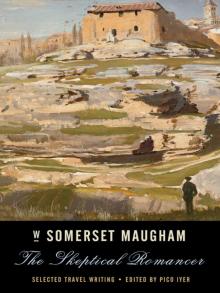 The Skeptical Romancer: Selected Travel Writing
The Skeptical Romancer: Selected Travel Writing The Summing Up
The Summing Up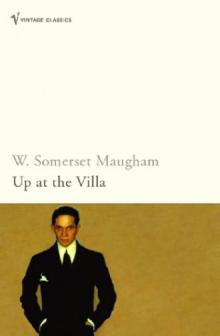 Up at the Villa
Up at the Villa The Razor's Edge
The Razor's Edge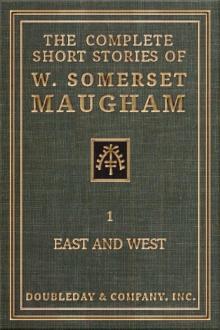 The Complete Short Stories of W. Somerset Maugham: East and West (Vol. 1 of 2))
The Complete Short Stories of W. Somerset Maugham: East and West (Vol. 1 of 2))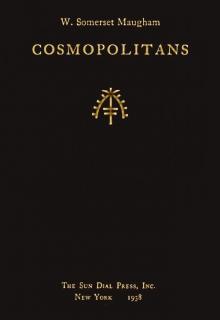 Cosmopolitans
Cosmopolitans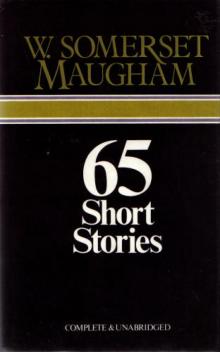 65 Short Stories
65 Short Stories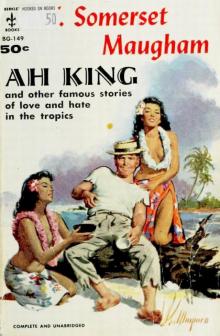 Ah King (Works of W. Somerset Maugham)
Ah King (Works of W. Somerset Maugham) Collected Short Stories: Volume 1
Collected Short Stories: Volume 1 Collected Short Stories Volume 2
Collected Short Stories Volume 2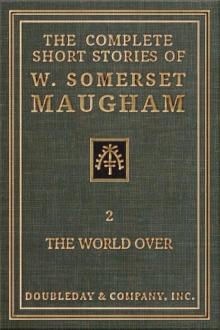 The Complete Short Stories of W. Somerset Maugham - II - The World Over
The Complete Short Stories of W. Somerset Maugham - II - The World Over Collected Short Stories Volume 4
Collected Short Stories Volume 4 Theatre
Theatre Short Stories
Short Stories Then and Now
Then and Now The Favorite Short Stories of W. Somerset Maugham
The Favorite Short Stories of W. Somerset Maugham Of Human Bondage
Of Human Bondage The Magician
The Magician The Great Exotic Novels and Short Stories of Somerset Maugham
The Great Exotic Novels and Short Stories of Somerset Maugham A Writer's Notebook
A Writer's Notebook Christmas Holiday
Christmas Holiday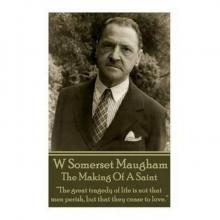 The Making of a Saint
The Making of a Saint Merry Go Round
Merry Go Round The Narrow Corner
The Narrow Corner Collected Short Stories Volume 3
Collected Short Stories Volume 3 Ten Novels and Their Authors
Ten Novels and Their Authors Ashenden
Ashenden The Moon and Sixpence
The Moon and Sixpence Cakes and Ale
Cakes and Ale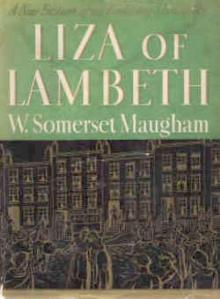 Liza of Lambeth
Liza of Lambeth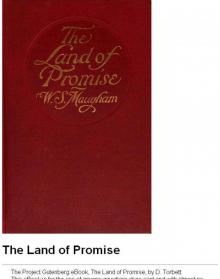 The Land of Promise: A Comedy in Four Acts (1922)
The Land of Promise: A Comedy in Four Acts (1922) A Writer's Notebook (Vintage International)
A Writer's Notebook (Vintage International)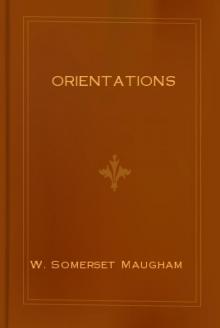 Orientations
Orientations Selected Masterpieces
Selected Masterpieces Mrs Craddock
Mrs Craddock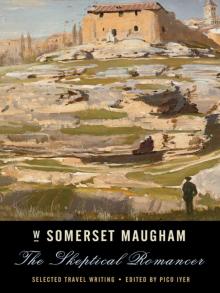 The Skeptical Romancer
The Skeptical Romancer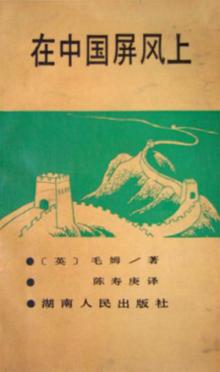 On a Chinese Screen
On a Chinese Screen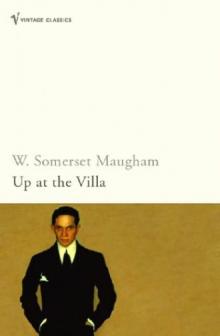 (1941) Up at the Villa
(1941) Up at the Villa The Great Novels and Short Stories of Somerset Maugham
The Great Novels and Short Stories of Somerset Maugham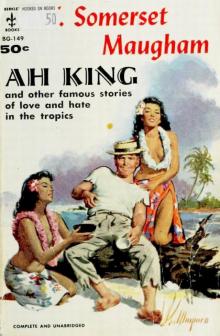 Ah King
Ah King The Explorer
The Explorer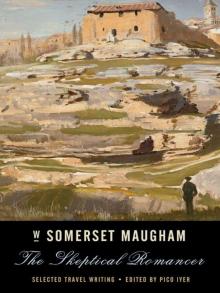 The Skeptical Romancer: Selected Travel Writing (Vintage Departures)
The Skeptical Romancer: Selected Travel Writing (Vintage Departures)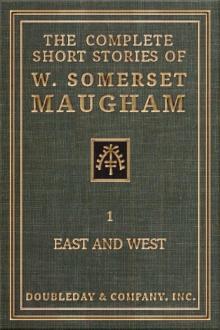 The Complete Short Stories of W. Somerset Maugham - I - East and West
The Complete Short Stories of W. Somerset Maugham - I - East and West